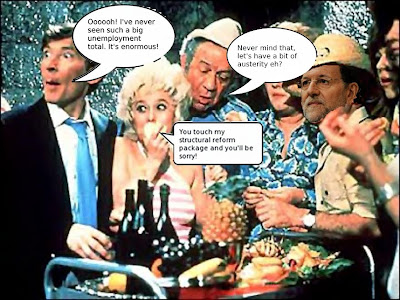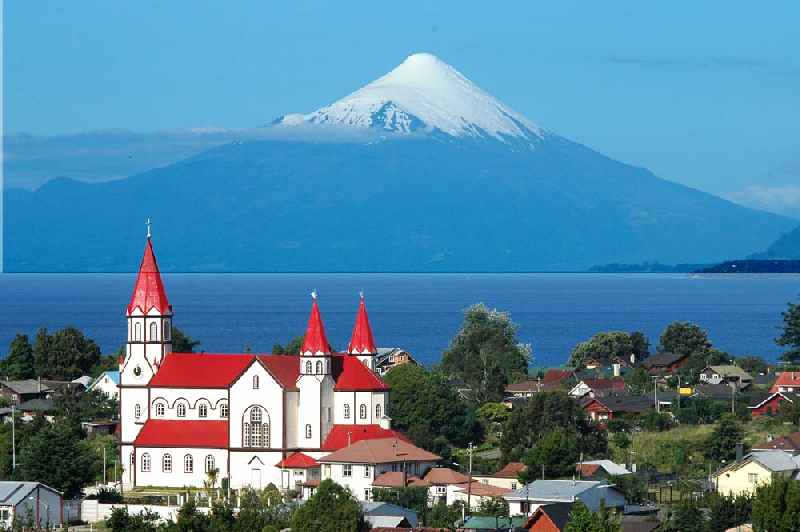Suddenly, Spain's government has decided that its priority for the coming months is what it describes as 'democratic regeneration'. These are words that few have ever associated with the Partido Popular and Mariano Rajoy but there's no need to worry; Spain's right wing hasn't suddenly caught the democracy 'bug'. The weight of that long political tradition is still sufficient to ensure that the PP regards anything smacking of greater democracy as something to be avoided at all costs.
Instead we are getting a response to the dismal results that Spain's two main political parties obtained in May's elections for the European Parliament. 2015 is a big election year in Spain, if everything is scheduled as expected the country will have municipal and regional elections followed a few months later by a general election. The shock of the European elections was twofold, firstly because support for the two main parties combined fell just short of 50% of the vote, and secondly because of the surprise emergence of Podemos as a potential threat to that two party hegemony.
The PP does not panic in a very public way, but results which had the party not even reaching 30% of the vote in their strongholds of Madrid and Valencia have had a profound effect internally. Were this pattern to be repeated in the municipal and regional elections then the PP faces the prospect of losing power in places where they have governed for decades. Imagine the bonfire of incriminating documents that might mean, assuming of course that any incriminating paperwork that exists hasn't already already been destroyed in the wake of all the corruption scandals of the last few years.
The PP has an abysmal problem in reaching agreements with other parties, and the prospect of either governing in minority or passing to the opposition is too terrible to contemplate. Something must be done, and that something appears to consist of manipulating electoral law to ensure they can still govern with fewer votes. Pioneer in the gerrymandering exercise has been Maria Dolores de Cospedal, who combines her job as secretary general of the PP with that of president in Castilla La Mancha. Using the excuse of austerity, Cospedal has pushed through a law drastically reducing the number of members of the regional parliament. The new law has the happy effect of both making it harder to dislodge the PP from power and of effectively excluding any smaller parties from representation unless they can overtake one of the big two.
Inspired by such an impeccably democratic example, Mariano Rajoy has announced that he intends to change electoral law for the municipal elections so that the party which receives the most votes gets to govern regardless of whether they have an absolute majority or not. Although they talk of a minimum threshold necessary for a party to claim control of a city without winning the election, we will have to wait and see what the PP tries to get away with. Currently they talk of 40% of the vote, but that could easily be lower if the poll data they manage isn't looking good. Today's El Mundo poll has them on 30% nationally, a third of those who voted for Rajoy in 2011 have gone and many may not be returning. Rajoy seems determined to push through a major change in electoral law regardless of whether any other party supports it or not, and the talk of 'democratic regeneration' is merely the cynical touch the PP seems to feel is needed to decorate all of their measures. If that's still not cynical enough for you they also claim the change will help to avoid corruption.
The illusion of change in order to ensure that everything remains safely in the same hands seems to have become the trademark of Rajoy's administration and the management of the country's crisis. As the two-party system shows signs of weakness they change to law to try and prop it up. If someone like Pablo Iglesias becomes popular partly as a result of television appearances, then the PP has a solution; try to make sure he doesn't appear on television. It's the concept of the managed democracy they hoped for after Franco's death, sure people can vote but not just for anybody. Come on. This is not just the attitude of the PP, the whole establishment of the transition years gets intensely nervous at anything that might upset the cozy cronyism they have nurtured carefully for so many years.
There is a delicious irony in seeing all those who shouted in 2011 that what the indignados had to do was form a political party and present themselves for election changing their tune. Now that a section of the movement appears to have done just that and with a certain amount of success, not just the music changes as laws get quickly changed to preserve the status quo at any cost. This is not just about Podemos, new broader based civic platforms are quickly forming to present alternative candidacies in big cities like Barcelona, Sevilla and Madrid. The common denominator is a rejection of the old way of doing politics, and of those who administer the crisis in their own interests.
The emergence of Podemos, placed just behind the PSOE in El Mundo's poll, has had the effect of provoking some kind of crisis in almost all of Spain's political parties. This was most evident with the PSOE, who finally realised they had to renovate their image after over 2 years of steady decline rather than improvement in opposition. The unconvincing way they have done this, with all sorts of manoeuvres to try and fix the election of a new leader, doesn't bode well for a significant change of direction. The PP, who vilified Rubalcaba as being the epitomy of evil, suddenly realised how much they will miss him as they become the only party of the 'old guard'. They were much more comfortable with the ritual 'y tú más' sessions that the increasingly rare parliamentary debates in Spain consist of.
Perhaps the party which has taken the biggest hit from Podemos has been Izquierda Unida, who found themselves pushed behind the new party in several regions. IU had benefited from disenchantment with the major parties, but not as much as they should have. Podemos come in a with a different language and fresher style, and the leadership of IU has been left wondering what happened. The dead hand of the Spanish Communist Party has damaged IU's prospects for years as many of those who could be attracted to the platform left to do other things. Those behind Podemos amongst them.
Even Unión Progreso y Democracia, who presented themselves as a safe way to break the two party hold, have a crisis of their own as they are no longer in pole position to be the alternative. Still very much the personal project of Rosa Diez, the party machine reacts badly to dissent and those who favour a fusion or agreement with Ciudadanos are subjected to insults by the loyalists. Diez apparently believed she could eclipse the Catalan upstarts, but her right wing media allies seem to be in favour of the merger and have fanned the flames. Again, the emergence of Podemos leaves UPyD looking every bit as much a part of Spain's political establishment as the two big parties, a case that is supported by the reaction of its leaders to the new party.
The opinion polls differ greatly on just what is happening, and are also subject to ever greater manipulation as part of the, occasionally hysterical, counter attack. The attempt by El País a few weeks ago to spin a revival in the PSOE's fortunes following the election of Pedro Sánchez as leader was widely criticised because of the way in which they found a 10% increase in support for the major parties that no other poll seems to detect. The pollsters in general have yet to offer any explanation for how they got the voting pattern so badly wrong in the European elections, and given that there have been no elections since you have to wonder how they are adjusting their polls to fit the new scenario?
The European elections in Spain are special in that they are the most representative, despite the low participation. This is because it is a national vote and therefore doesn't suffer the sort of deformation present in general elections here, that which allows Rajoy to have an absolute majority in parliament with well under 50% of the vote. Precisely the sort of system he now wants to introduce in municipal elections too. Incidentally, if you think that the Spanish electoral system has been brutally unfair in past general elections, just wait and see what happens in the next election if the two major parties have a lower vote but are still clear of any rivals. That could really provoke some democratic regeneration.









